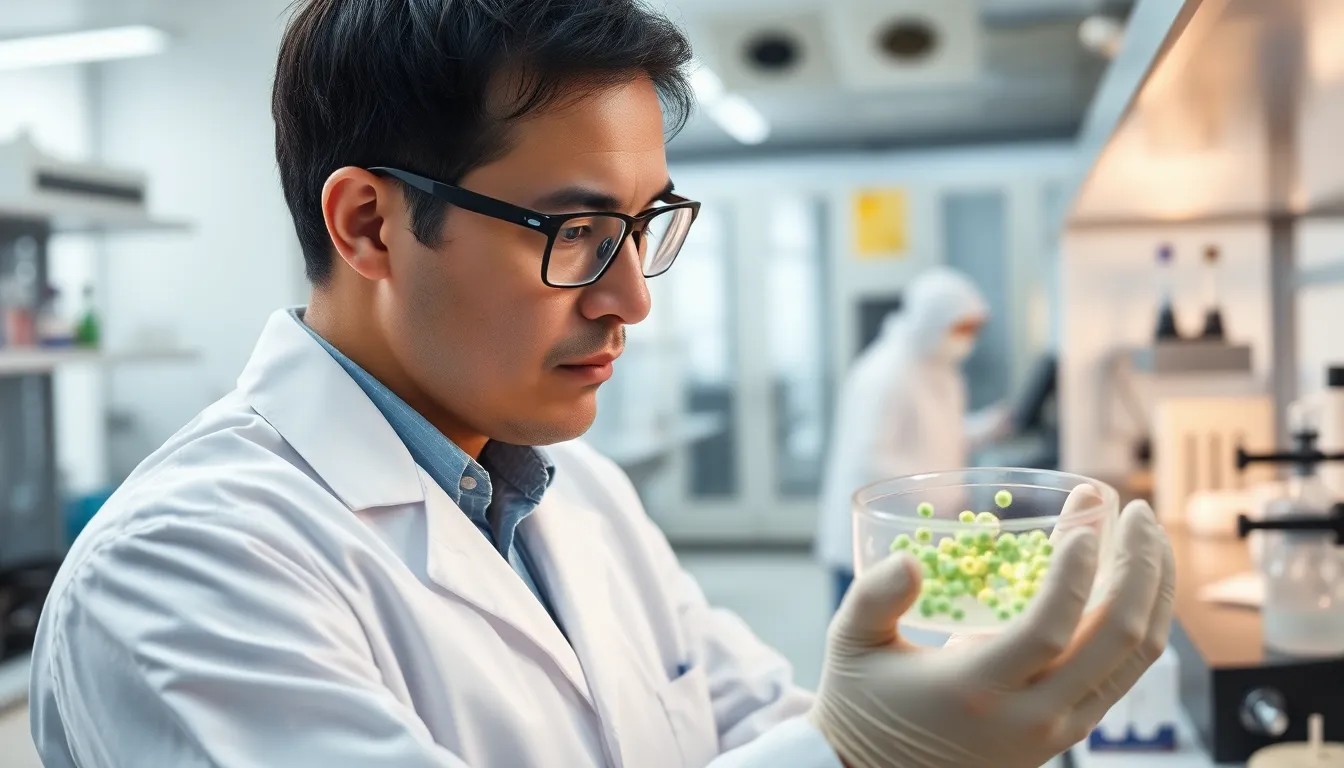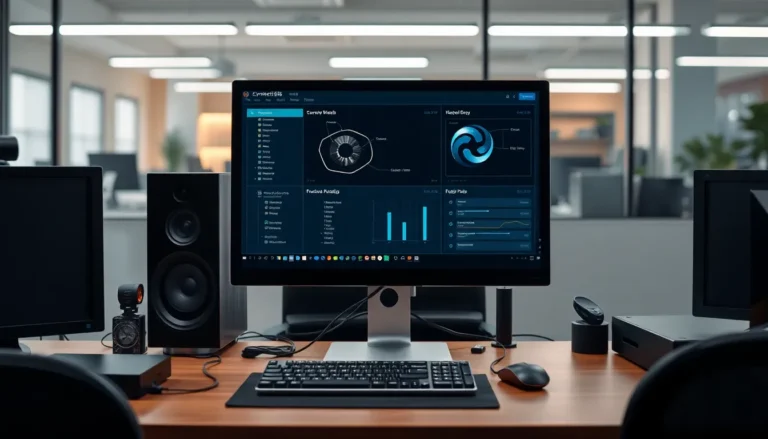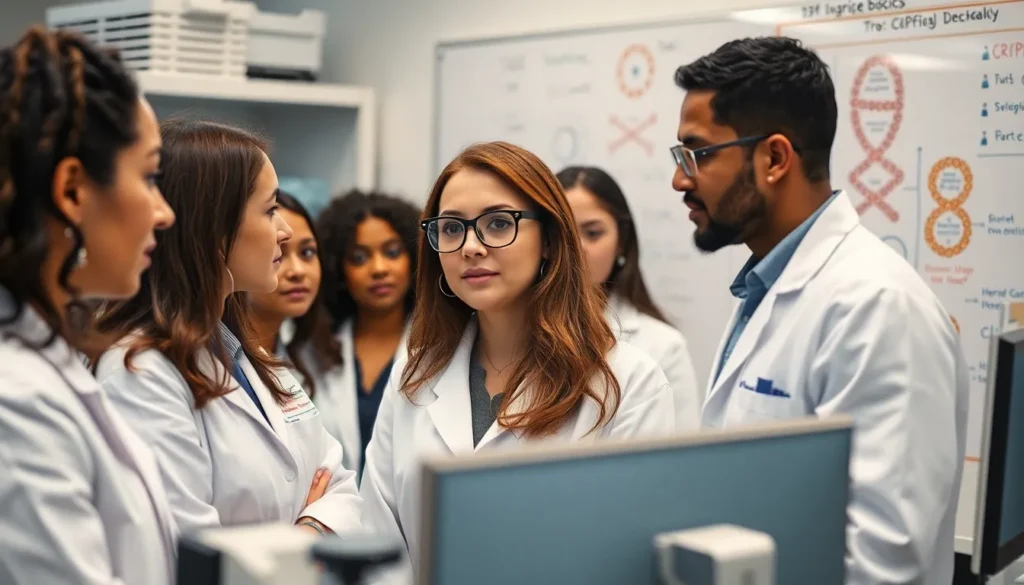Table of Contents
ToggleIn the bustling world of science, American biotech labs are the unsung heroes, turning dreams of groundbreaking innovations into reality. Picture a place where scientists wear lab coats and safety goggles, mixing potions that could cure diseases or create the next superfood. It’s like a real-life version of “Breaking Bad,” minus the drama and questionable ethics.
These labs are at the forefront of revolutionizing healthcare, agriculture, and environmental solutions. With cutting-edge technology and a sprinkle of ingenuity, they’re not just pushing boundaries—they’re redefining them. From gene editing to personalized medicine, American biotech labs are making waves that could change the world as we know it. So, buckle up as we dive into the fascinating realm of biotech, where science meets innovation, and the future is crafted one experiment at a time.
Overview of American Biotech Labs
American biotech labs play a pivotal role in the landscape of scientific research and innovation. These facilities focus on diverse fields such as health, agriculture, and environmental sustainability. Scientists collaborate in these labs to explore gene editing technologies like CRISPR, which dramatically enhance the precision of genetic modifications.
Research projects often address pressing issues, from developing novel therapies for chronic diseases to creating sustainable agricultural practices. Cutting-edge technologies, including artificial intelligence and machine learning, are increasingly integrated into research processes, optimizing data analysis and accelerating discovery timelines.
Many American biotech labs cultivate partnerships with academic institutions and pharmaceutical companies. This collaboration fosters a pipeline of talent and resources, facilitating advancements in drug development and clinical trials. Labs also prioritize compliance with regulatory standards set by agencies such as the FDA, ensuring that research adheres to safety and efficacy requirements.
Investment in biotechnology continuously rises. The National Institutes of Health reported approximately $42 billion in funding for biomedical research in 2022. This financial backing supports a range of initiatives, from basic research to applied sciences, directly influencing public health outcomes and economic growth.
Biotech innovations frequently lead to breakthroughs in personalized medicine, revolutionizing treatment approaches based on individual genetic profiles. Labs focus on developing tailored therapies, ensuring patients receive the most effective care for their unique conditions. American biotech labs, therefore, embody a dynamic convergence of science and technology, striving to improve lives through innovation.
Key Innovations in American Biotech Labs

American biotech labs are setting new standards in science through innovative breakthroughs. They focus on critical advancements across various fields like genetics and drug development.
Advancements in Genetics
Gene editing technologies are at the forefront of research. CRISPR technology shows promise in enhancing genetic modifications, leading to precise treatments for genetic disorders. Labs conduct experiments on gene therapies that address conditions such as sickle cell anemia and muscular dystrophy. Scientists aim to optimize these therapies through collaboration with computational biologists, leveraging artificial intelligence for data analysis. This synergy accelerates discovery, illustrating the potential of genetic advancements to change lives.
Breakthroughs in Drug Development
Drug development has significantly evolved within these labs. Innovative approaches emphasize personalized medicine, tailoring therapies based on individual genetic profiles. Collaborations with pharmaceutical companies drive the creation of novel drugs for chronic diseases such as cancer and diabetes. Clinical trials in biotech labs ensure compliance with rigorous FDA standards, prioritizing safety and efficacy. Increased funding, reported at approximately $42 billion from the National Institutes of Health in 2022, supports these pioneering initiatives, underscoring the labs’ role in enhancing public health outcomes.
Leading American Biotech Labs
American biotech labs lead innovation across various fields, significantly impacting healthcare, agriculture, and environmental solutions. These institutions focus on advanced research that meets global challenges.
Lab 1: Overview and Achievements
Genentech, established in 1976, stands as a pioneer in biotechnology. This lab focuses on developing medicines for serious medical conditions. Genentech’s notable achievements include the introduction of the first targeted cancer therapeutics. Innovations in monoclonal antibodies have transformed treatment methods for breast cancer, rheumatoid arthritis, and multiple sclerosis. The lab also emphasizes collaboration with academic institutions, enhancing research capability and driving groundbreaking discoveries. In 2022, Genentech received FDA approval for a new drug targeting Alzheimer’s disease, showcasing its commitment to advancing medical science.
Lab 2: Overview and Achievements
Amgen, another leader in the biotech industry, has operated since 1980. This lab primarily concentrates on developing human therapeutics with an emphasis on serious illnesses. Amgen’s achievements include the development of biologic medicines that treat conditions such as cancer and kidney disease. Their recent advancements involve gene therapies aimed at rare genetic disorders. In 2022, Amgen published results on a promising treatment for sickle cell disease, highlighting its continuous innovation in the biotech field. Partnerships with universities and collaborations with pharmaceutical companies bolster Amgen’s research initiatives, further propelling its growth in the biotechnology landscape.
Regulatory Challenges Faced by American Biotech Labs
American biotech labs encounter significant regulatory challenges in their pursuit of innovation. Adherence to regulations set forth by the FDA guarantees the safety and efficacy of research outcomes. These regulations often dictate the timeline for drug development, creating potential delays. Compliance with stringent guidelines can require extensive clinical trials, demanding more time and resources.
Navigating intellectual property laws presents another challenge for biotech labs. Protecting innovative technologies such as CRISPR and gene therapies is crucial for maintaining competitive advantage. Furthermore, obtaining patents involves a complex and lengthy process that can hinder progress. Securing funding also becomes problematic as investors typically prefer more straightforward, less encumbered projects.
Collaboration with academic institutions is essential in overcoming regulatory hurdles. Partnerships provide access to expert knowledge, ensuring compliance with the latest regulations. Such alliances can streamline the research process and improve the chances of regulatory approval. Labs that engage with regulators during the research phase often find smoother pathways to market entry.
Bureaucratic obstacles arise when dealing with multiple regulatory bodies. Variations in state and federal requirements can complicate the research landscape. Adapting to these differences demands a strong understanding of legal frameworks, which may divert attention from scientific innovation.
American biotech labs face a range of regulatory challenges. Addressing these issues requires strategic planning, collaboration, and a deep understanding of compliance protocols. Facing strict regulations and navigating complex intellectual property rights defines the biotech landscape while emphasizing the need for innovation and collaboration.
Future Trends in American Biotech
Innovations are shaping the future of American biotech labs. Precision medicine drives significant advancements, enabling tailored therapies for individuals based on genetic profiles. Artificial intelligence enhances research capabilities, optimizing data analysis and accelerating discoveries across various sectors.
Gene editing technologies, particularly CRISPR, remain at the forefront, offering new solutions for genetic disorders. Continued experiments on gene therapies for conditions such as muscular dystrophy promise to revolutionize treatment. Collaborations between biotech companies and academic institutions foster a vibrant ecosystem for research and development.
Growing investment in biotechnology signifies an optimistic outlook. In 2022, the National Institutes of Health reported approximately $42 billion in funding for biomedical research. This financial support cultivates an environment conducive to innovative solutions for chronic diseases and healthcare challenges.
Regulatory landscapes are shifting, with efforts to streamline compliance processes. Understanding the complexities of FDA regulations can mitigate delays in drug approval. Partnerships with academic institutions also play a crucial role in navigating these regulations, ensuring efficient research progress.
Environmental sustainability is becoming a focal point for biotech research. Labs increasingly explore bioengineering solutions that promote sustainable agricultural practices. Enhanced techniques drive efficiency in food production while addressing pressing environmental issues.
Market dynamics influence the strategic direction of biotech firms. Competitive pressures demand continuous innovation, prompting labs to invest in cutting-edge technologies. As the landscape evolves, American biotech remains poised to impact global health and sustainability profoundly.
American biotech labs are at the forefront of innovation shaping the future of healthcare and sustainability. Their commitment to advancing technologies like CRISPR and personalized medicine showcases their potential to address critical health challenges. Collaborative efforts between labs, academic institutions, and pharmaceutical companies not only enhance research capabilities but also streamline the path from discovery to market.
As investment in biotechnology continues to rise, the sector is well-positioned to adapt to evolving regulatory landscapes and emerging global health needs. The ongoing focus on environmental sustainability further underscores the transformative power of American biotech. With a strong foundation of collaboration and innovation, these labs are set to make lasting impacts on society.







